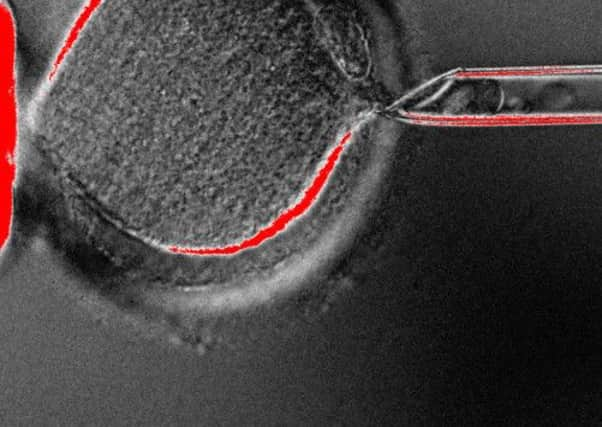Stem cell hope for stroke victims after trial


Five out of nine patients at Glasgow’s Southern General Hospital who received injections of stem cells into the damaged parts of their brain have regained some lost movement and strength, which has noticeably improved their daily life.
One 80-year-old said he could now grip things, such as rails, with his stroke-affected hand.
Advertisement
Hide AdAdvertisement
Hide AdNeuroscientists said the early results, being presented today at the European Stroke Conference in London, were “surprising and encouraging”.
However, they stressed that although it seemed unlikely the improvements were a placebo effect, it was too soon to say for certain whether the stem cells were causing patients’ brains to regenerate as hoped.
Professor Keith Muir, a neuroscientist at Glasgow University who is leading the study, said: “The fact that we have some people getting better is very good for those people taking part, and quite a surprise.
“This is a safety trial, so it was not designed to see if we are getting a definite effect [from the stem cell therapy]. It is encouraging and intriguing enough to think that this is something that is worth pursuing. We need to keep working in this area and do further trials.
“Depending on the measures that we used, we saw improvements in all nine patients with some measures at some times. Five of the patients showed improvements in [what they can do in] their day-to-day activities.”
Prof Muir added: “This is not what we would have expected in this group, but we are far from being able to say whether it’s specifically related to the cells.
“We suspect that a large part of what we do is kick-starting repair processes that are already present in the body.”
Every year, about 150,000 people in the UK suffer a stroke, including 12,000 people in Scotland. Most recovery occurs within the first few months, and many patients are left with lasting impairments to their speech and movement.
Advertisement
Hide AdAdvertisement
Hide AdThe patients in the Glasgow trial all had a stroke between six months and five years previously and had shown no signs of spontaneous improvement.
Frank Marsh, 80, said he had regained some use of his left hand. “I can grip certain things, like the hand rail at the baths, with my left hand as well as my right,” he said. “It still feels fairly weak and it’s still a wee bit difficult to co-ordinate but it’s much better than it was.”
Chest Heart and Stroke Scotland chief executive David Clark said: “If the results can be confirmed in clinical trials, stem cell therapy offers the potential to make a real difference to people whose lives have been devastated by the effects of stroke.”
The trials are opposed by anti-abortion groups because they use foetal nerve tissue.
Full results are due to be published next year.